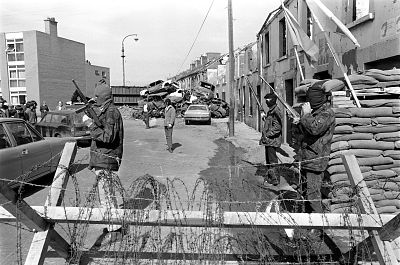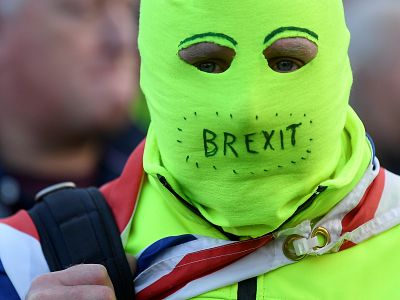"Things we're likely to see are hate crimes, people shouting on the streets, physical altercations," said an analyst at the Risk Advisory Group.
LONDON — From a surge in racist attacks to anger over food shortages and chaos at the border, some risk experts are warning that Britain's potential exit from the European Union without a deal could lead to violence and unrest.
 ADVERTISEMENT
ADVERTISEMENT
 ADVERTISEMENT
ADVERTISEMENT
"Things we're likely to see are hate crimes, people shouting on the streets, physical altercations, and in some of the more extreme bits of the internet that we're looking at, higher impact planned acts of violence," said Jesper Cullen, an analyst at the Risk Advisory Group, which advises companies and governments on managing political and security risks.
Britain voted to leave the E.U. in June 2016, with many in the majority saying they were protesting the surge in immigration. A sticking point in exit negotiations with the E.U. has been how the U.K.'s immigration system will change after it leaves the bloc — a particularly thorny issue given that Boris Johnsonwent from being a leading voice for Brexit and for curbing immigration to becoming the voice of the government as prime minister. And that worries risk experts like Cullen.
"People see the government putting out some pretty strong rhetoric on immigration, pushing for a no-deal Brexit," he said. "These sorts of indications make it seem there's quite a high likelihood that people will feel legitimized to encourage or force foreigners out of the country."
Indeed, in the month after the Brexit vote, hate crimes surged 41 percent, government statistics showed. And now, after nearly two and a half years of bitter debate, Johnson says he is prepared to lead the country out of the E.U. on Oct. 31 regardless of whether he can negotiate a deal. But leaving without a deal could force Britain out of a raft of security and intelligence-sharing arrangements with the bloc, a move that could slow investigators and increase security risks.
For example, the U.K. can currently check the criminal records of citizens of other E.U. member states within an average of six days. The average wait for a non-E.U. member state is 66 days, the National Police Chiefs' Council said in February.
The police chiefs council also warned it could lose access to an E.U.-wide system that allows the sharing of information about wanted or missing people in real time, a database Britain accessed 539 million times in 2017.
"On Day One of us leaving, if no additional provisions are made … our access to those systems would fall below countries like the U.S., Canada and Australia, all of whom have separate access arrangements with the E.U.," said Alexander Babuta, a national security expert at the Royal United Services Institute, a London-based defense think tank.
That will hamper security checks at Britain's border, which will already be swamped in the case of a no-deal Brexit as officials grapple with new customs and immigration arrangements.
E.U. membership guarantees the "frictionless" movement of goods and people throughout the bloc, which will end for Britain when it leaves.
"Border forces are quite critically under-resourced, and with Brexit the pressure on that organization is only going to increase," Babuta said. "So there's no doubt that that's going to open more opportunities for organized crime."
The border to watch after a no-deal Brexit is the one between Northern Ireland, which is part of the U.K., and the Republic of Ireland, which is a member of the E.U.
There is currently no physical border, with seamless trade and travel underpinning the 1998 Good Friday Agreement that helped end decades of conflict in the region known as "the Troubles."
Whether the border can remain open after Brexit is in dispute. The government insists that technology and light-touch regulation means a hard border will not be necessary.
But this month a leaked government report — dubbed Operation Yellowhammer — said such a model would most likely be "unsustainable" given post-Brexit tariffs and regulatory requirements.
That raises the prospect of a hard border, which police fear could restoke tensions.
"The minute we go into that area in a way that looks like checkpoints or supporting other agencies to staff checkpoints, we become a target for ... dissident Republicans," the head of Northern Ireland's police service, Simon Byrne, told the BBC on Aug 22.
A physical border could also act as a recruiting tool for violent groups if the region's economy is affected, Cullen said.
"If you look at what drives people to gangs, to violence, to these sorts of groups, a lack of other economic opportunities tends to be a major factor," he said. "So we're looking at the impact of a no-deal Brexit on Northern Ireland."
Government officials have dismissed the Yellowhammer report as "scaremongering" and a "worst case scenario."
The document also says there will be protests and may be "a rise in public disorder and community tensions," but gives no details.
Experts do not expect mass protests in the immediate aftermath of a no-deal Brexit and say that British police are well equipped to deal with them if they do emerge.
However, localized, smaller protests and possible civil unrest over shortages and job losses are a concern.
Delays at the border and new customs rules are likely to affect food, medicine and fuel supplies, which could reduce choice and raise prices, the government report said.
"Empty shelves, we've seen in the past. Even when there's just been severe weather that's caused shortages, people get quite angry and turn on shops even though there's nothing they can do about it," said Alexandra Kellert, analyst at Control Risks, a consultancy that advises corporations, charities and governments. "That could be a trigger for unrest in local areas, and it could happen anywhere."












